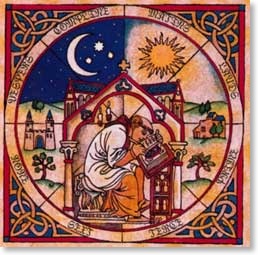
This morning, Scot McKnight suggests we respond to the liturgical turn among low church evangelicals, and he offers some particulars in his third post on this topic.
Scot thinks, as do I, that this trend is not an invitation to return to the prayers and hymnody of the 20th Century. It’s more complicated than that. He mentions some teaching and preaching approaches that could move us toward a reasoned response to the trend. These take work, thought and creative synthesis. There is no “book” that contains tidy scripts for us to follow. He writes:
Third, we need to have churches that express the gospel in our day and in our way that sustains its life from the Story of the Bible and in continuity with the Story of the Church. The biblical model is not one of simple repetition of the faith of our fathers and mothers but of re-engagement in a new day of the faith of our fathers and mothers. Jesus didn’t repeat Isaiah; he took Isaiah to a new level. Paul didn’t repeat Jesus; he applied Jesus to the Roman empire. Hebrews didn’t repeat Paul; he engaged Jesus in the creative metaphor of temple worship.
The same is true with the arts in worship: No book. Rather, we use books and media, new and old songs, hymns and prayers from a variety of traditions and ages, and… in Scot’s language, we “take [liturgy] to a new level.” In order to do this, I’m thinking the worship leader must be a student of, and participant in, popular culture.
What do you think?


It’s a great post by Scot and a timely conversation; to enter into a genuine dialogue with our past and to see ourselves connected to the variety of streams that inform our faith. But it does require pastoral boldness to give permission to be creative and to draw the lines at faddishness. Could these streams ever become genuinely present at a Midwinter?
Report This Comment
09.25.08 at 9:38 am
Don. I’m interested in that question, since I’m leading the worship planning team for Midwinter 2009!
Say more about your more recent Midwinter worship experiences. In what sense have streams converged? What opportunities have we missed?
I could give more prompts, but I’ll leave it at that for now.
Don and anyone else. Please jump in here. This is a good and timely conversation.
Katie Martinez
Report This Comment
09.25.08 at 10:24 am
OK, at the risk of sounding weird, a primary text for me on this most core issue is John 4 and Jesus’ conversation with the woman at the well.
What did Jesus mean when he told her, “Yet a time is coming and has now come when the true worshipers will worship the Father in spirit and truth, for they are the kind of worshipers the Father seeks…”
I think Scot’s language “new level,” “applied to,” “engaged Jesus” are words that call us to engage in spirit worship. The Spirit of God is the Spirit of life, creation, and the open and living future that is the resurrected Jesus. Life is not dormant nor stagnant-death is. Religion seeks to maintain the status quo: Spirit seeks to make all things new. Does our liturgy help us speak the gospel in such a way that we along with the women and men we encounter at the ‘well’ experience new creation?
Report This Comment
10.01.08 at 9:54 am
I strongly disagree with Scot that “the worship leader should be a student of, and participant in, popular culture.” In fact, I think worship should be a respite and refuge from some of the intellectual, emotional, and sensory assaults of popular culture.
Report This Comment
10.01.08 at 10:08 am
Virginia. Oops. Scot didn’t say the WL should be a student of pop culture. Those are my words. I’m thinking Jesus and Paul each had an understanding and appreciation for the contemporary cultures in which they taught, lived, worked, led. The “new level” that Scot speaks of involves a synthesis between what God has done before and what God is doing now. It also involves innovative communication. I’m thinking both Paul and Jesus were culturally astute. So… I was asserting that worship leaders and planners will, too, be more effective, if culturally astute.
Report This Comment
10.01.08 at 11:25 am
Thanks, Katie. My comment should have been directed to you. I agree with you that worship leaders should be culturally astute. Let’s not limit this to “popular” culture, however. Let’s look toward a “higher ground.”
Report This Comment
10.01.08 at 12:47 pm
Thanks Virginia. You’re so right. Our cultural awareness should not be limited to pop culture. I was remarking on pop culture, because Scot was talking about a convergence of old and new. That said, what place, if any, does pop culture have in worship?
Report This Comment
10.01.08 at 12:54 pm